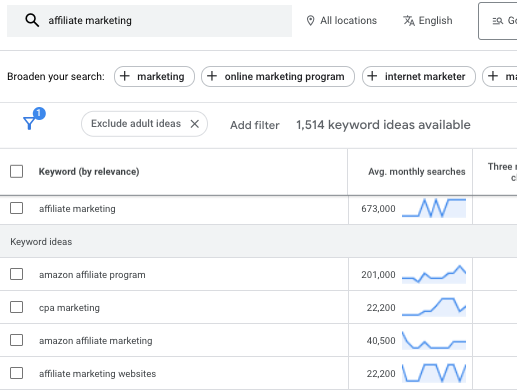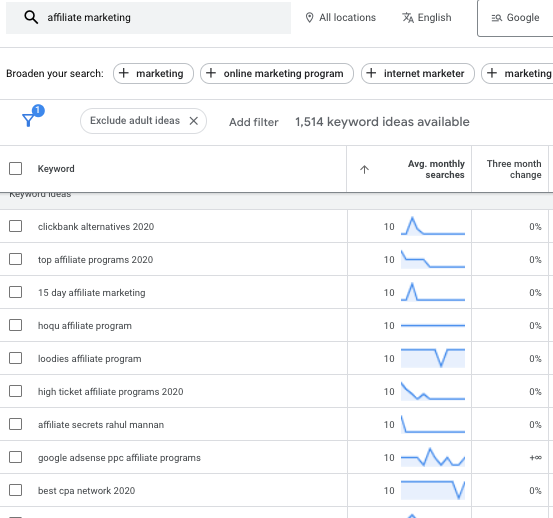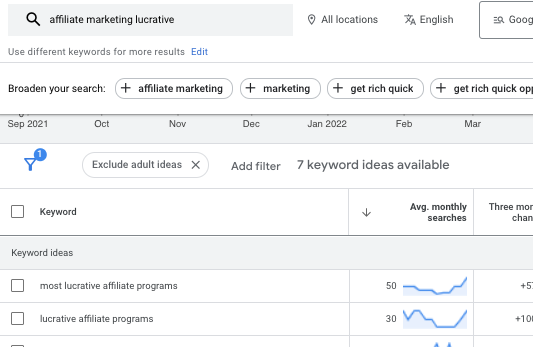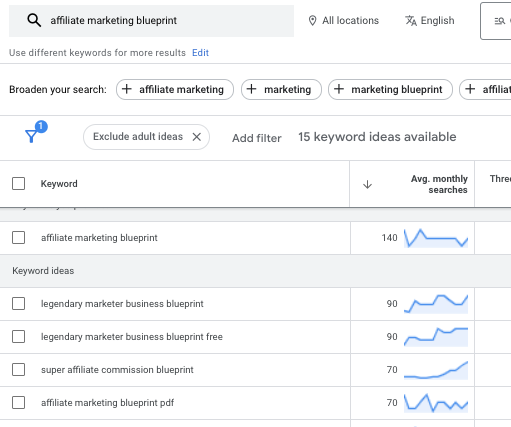If you can find high traffic keywords with low competition, you can rank for them on the search engines and get free traffic. That’s pretty cool if you can make it work. But how is this possible? Surely the high volume keywords are far more over subscribed than the low volume ones?
While this is true, there’s a grey area where some longer tail keywords still get a good monthly search volume. Because they are longer tail keywords, there’s less competition on the SERPS – search engine results pages. So, how do we go about finding these golden nuggets so we can create content for them and get free traffic? Here’s a few ideas I’ve found useful.
High Traffic Keywords With Low Competition – Keyword Planner
While there’s many keyword planners available now I still use Google’s keyword planner which is a free tool. It shows the searches on Google which relate to any keyword you care to type into the planner. So for my topic of affiliate marketing, I would start out with typing “affiliate marketing” into the planner for keyword ideas.
Here’s what the results at the top of the page look like:

Just look at the monthly search volume for the term “affiliate marketing”! It read 673,000 monthly searches for this term. Wouldn’t it be great to rank your website for this term? Your site would get thousands of hits overnight! Sadly this is near impossible to do because heading over to Google you will find the search competition is extremely high.
Even a phrase match (in quotes) of the term brings back a number of websites/pages ranking for the term as over 50 million! So your chances of writing a piece of content for affiliate marketing and ranking are frankly nill!
High Traffic Keywords With Low Competition: Using Google’s Keyword Planner

If we click on the Avg. monthly searches tab at the top of the columns in the keyword planner, we will see the longer tail and more obscure search terms which get fewer searches every month. But we don’t want to create content for these terms either. Even with a top ranking for “clickbank alternatives 2020” for example, we only get a share of the 10 (or less) monthly searches for this term every month.
Plus, does this term even relate to your website and the items you are selling? If not, it’s hardly worth the effort of creating some content for it is it?

High Traffic Keywords With Low Competition – What’s The Answer?
So what’s the answer? The answer lies somewhere in-between the super high traffic volume keywords and the long tail keywords with low SEO difficulty which don’t really warrant building content for. We also want to create content for the kinds of searches which bring buyers to our websites. To do this we need keywords which match the following criteria:
- Have a good monthly search volume which is worth our time
- Have low competition on the SERPS – search engine results pages to give us a chance of ranking our content
- Have a buyer intent or at least the potential of a buying customer
To find these gems takes a little ingenuity. Here’s a few examples of how you can find them:
- Look for your main keyword with the term “Pdf” attached to it
- Find other related terms such as free downloads, ebooks, blueprints, toolkits etc. think of other terms you can find.
- Look for keywords which are obscure and that many bloggers/content creators will miss/not look for
Here’s an example using the same keyword phrase of “affiliate marketing” but attaching pdf to it in the search tool.

Trading Off Search Competition For Search Volume
Of course the phrase affiliate marketing pdf doesn’t get as many monthly searches as the original term which was 673,000 a month. However, there’s considerably less content ranking in the SERPS for the pdf version and you’re much more likely to rank of it if you create a good, solid piece of content for it.
Here’s another example using the term “lucrative” which many content creators might miss out on.

Here’s another idea using the term “lucrative” which may apply to the affiliate marketing niche more than others of course:

Browse Through The Search Results
Another strategy is to browse through the search pages looking for keywords which have your minimum monthly search criteria.
We know the shorter tail keywords are too difficult to rank for, so we can start at the bottom (with low search volume) and work through the results looking for keywords which get at least 50 monthly searches, or even 100. Compare your results with a Google search to check on the relative competitiveness of the terms.
Generally speaking the fewer monthly searches for a term, the less competition you’ll find on Google search results. The more traffic a term gets, the more competition. But you can find some gems which have a good amount of monthly traffic but also have low competition using this strategy.
Look for the long tail keywords which are the most obscure and which are relevant to your particular niche. You can then create some high value content for your term, and potentially rank on Google. Don’t forget, even if you don’t obtain a high Google listing, you still might rank your content on other search engines such as Bing, Yahoo, Duckduckgo etc.
Best Strategy For Free Traffic
It is possible to find high traffic keywords with low competition. However, most of the high traffic keywords have already been capitalised on by website owners, bloggers and affiliate marketers. The high volume traffic keywords are typically much more difficult to rank for and the low volume traffic keywords are typically not worth working for!
So a good strategy is to find long tail keywords with low SEO difficulty which also offer some search traffic you can attain. This might be less traffic than you want, but by creating multiple pieces of high quality content, you can skim a lot of traffic overall using this strategy.
Also
Keep in mind that you want to focus on traffic that converts, so you also need to be mindful as to the search intent behind a particular keyword phrase before you spend a lot of time on it. You’ll also be sharing the monthly search traffic with the top few listings even with a top listing on Google!
So even a 100 monthly search traffic volume will look a lot less when you finally get traffic from the term since it’s shared out with other top listings and any paid ads which are running for the keyword. You essentially only get about a third of the traffic when all said and done! So if the keyword shows 100 monthly search volume, and you rank your site at the top, you’ll probably only get 33 hits on a monthly basis at the most!

However, if you write good content and your content stands the test of time, you can capitalise on search terms which grow in numbers over time. This is also a good reminder that going after search terms which only get 10 searches a month may indeed be a waste of your time! 10 searches a month divided by three gives you only 3.3 hits a month even if you get first place!